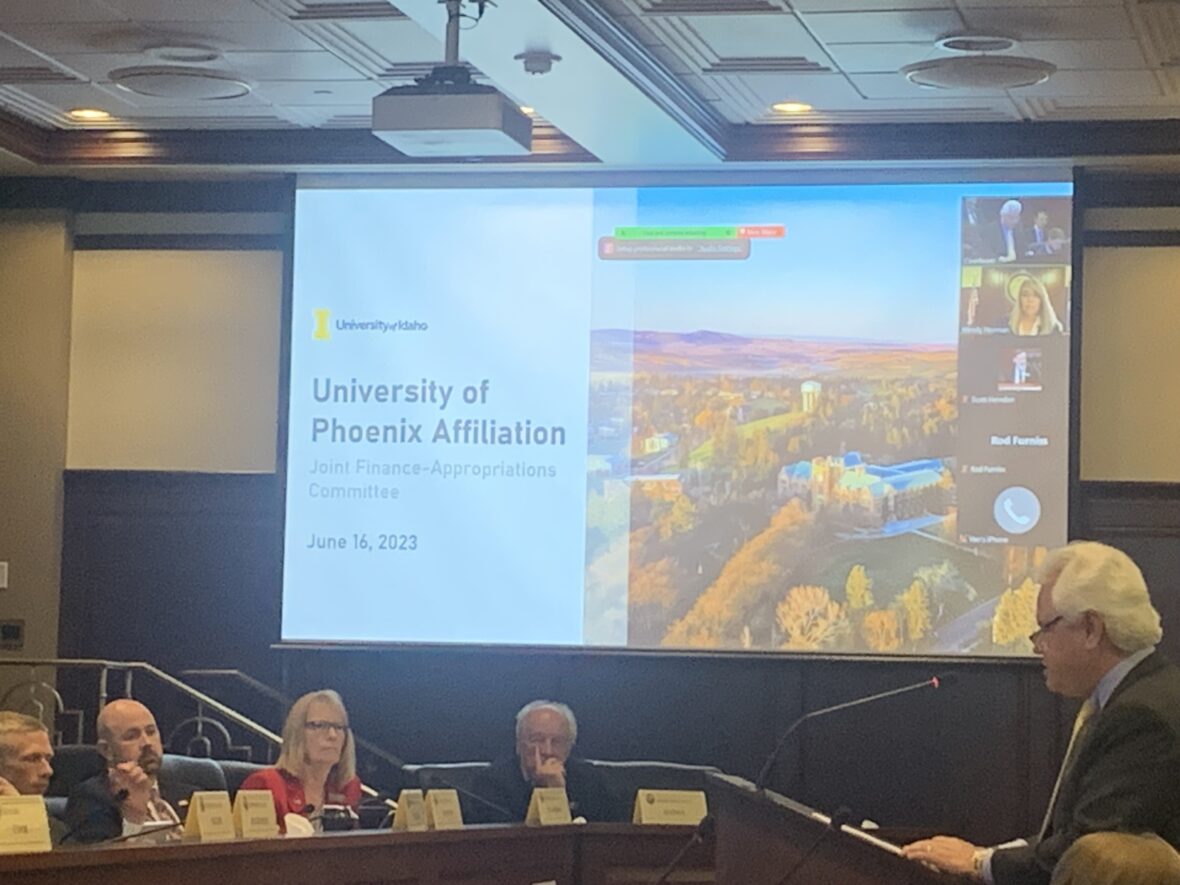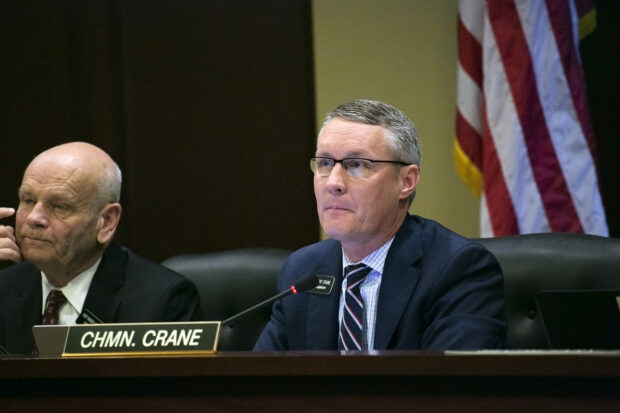
There are a lot of things legislators don’t like.
Getting blindsided ranks high on the list.
That unsurprising truth was in sharp display Thursday morning, when the House State Affairs Committee introduced a resolution that could stymie the University of Idaho-University of Phoenix partnership. Cut out of the closed-door negotiations, lawmakers are venting their frustrations just as the two parties are trying to close a complicated and controversial $685 million deal.

“If we are going to enter into acquisitions of this magnitude, we need to be at the table,” said Rep. Brent Crane, R-Nampa, stepping back from his customary seat as chair of House State Affairs to unveil the bipartisan House Concurrent Resolution 26.
The U of I and the State Board of Education could soon get a feel for the fury of a Legislature scorned. After a unanimous vote to “print” the resolution, the committee will probably hold a public hearing that promises scintillating theater. Crane said he looks forward to hearing the State Board’s side, and its reasoning for approving the purchase after a series of closed executive sessions. What Crane didn’t say — but what goes without saying — is that he and other lawmakers are eagerly awaiting their chance to grill the State Board and the U of I in a public forum.
It’s going to be a showdown. And one the U of I and the State Board could have seen coming.
Let’s rewind back to May 17, the day before the State Board met in its role as the U of I’s board of regents, and approved the Phoenix deal in its one and only public discussion of the matter. That was the day when legislators — and, if we’re being completely honest, pretty much everyone else in Idaho — finally learned a deal was in the works.
That morning, State Board executive director Matt Freeman, U of I lobbyist and former legislator Caroline Nilsson Troy and Matt Reiber, Gov. Brad Little’s education aide, scheduled a series of briefings with legislative leaders. Troy wrote up a summary of the meetings in an email, obtained by Idaho Education News through a public records request. One line proved prescient: “Although the Idaho Legislature has ‘no involvement,’ it doesn’t mean it won’t get involved.”
Yup.
There’s another thing legislators don’t like: being told what they can and cannot do.
The U of I has asserted the Legislature has no say in the matter.
“The UI Board of Regents’ approval is the only governing board approval required for the transaction to move forward,” the U of I said in a report to its accreditors, also obtained through an EdNews records request. “No approval from any state of Idaho or other governmental agency is required.”
Depends who you ask.
On Thursday, Crane argued that the Legislature is responsible for expenditures and debt. And there is no question that the Phoenix deal involves a mountain of debt. It will fall to a U of I-affiliated nonprofit to go out into the bond market and finance the $685 million deal. The Legislature’s resolution, which opens up the possibility of a lawsuit, certainly won’t make it easier to secure bonds.
Even if the resolution doesn’t pass — or even if it does pass, and the Legislature stops short of a lawsuit — it will provide a platform for lawmakers to air months of pent-up questions about one of the biggest transactions in state history. Prior to Thursday morning’s discussion, which lasted less than 10 minutes, lawmakers have had only one hearing on the Phoenix deal: a probing, two-hour Joint Finance-Appropriations Committee oversight hearing in June.
“New questions continue to emerge, about the legal and fiscal risks of the deal,” said Rep. Wendy Horman, R-Idaho Falls, JFAC’s House co-chair.
And in a public hearing, anything goes. That much was evident, even during Thursday morning’s brief discussion.

The resolution’s co-sponsor, Rep. John Gannon, D-Boise, took the occasion to again criticize the U of I for its practice of billing for public records. (Full disclosure: EdNews has received several bills for Phoenix-related records requests.)
“If it’s such a good deal, then we should know everything,” said Gannon, the one lawmaker who attended the State Board’s May 18 public meeting. “Everything should be on the table at this point.”
This debate could divide some of Idaho’s most powerful people into two distinct camps: those who knew about a Phoenix deal before May 17, and those who didn’t.
In that former camp, you have the U of I and State Board officials who have ardently defended this purchase and the closed-door discussions that got us to that point. And we can put Gov. Brad Little into this group as well. He was brought into discussions in March. And by early May, Little was on board, according to a May 7 email from State Board executive director Matt Freeman, obtained through an EdNews records request.
Those are the folks who were in the loop.
On the other side, potentially, are the citizen legislators who learned about the Phoenix deal at the same time as the rest of Idaho’s citizenry.
Legislators have the potential to throw a wrench into the machinery — as the U of I hopes to finance the deal, and as a voluntary May 31 opt-out date looms. They also have the opportunity to force, finally, a public debate of the Phoenix purchase.
“We do welcome further conversations with our legislators,” U of I spokeswoman Jodi Walker said in an email Thursday.
Welcome or not, those “conversations” are now inevitable.
Kevin Richert writes a weekly analysis on education policy and education politics. Look for his stories each Thursday.
